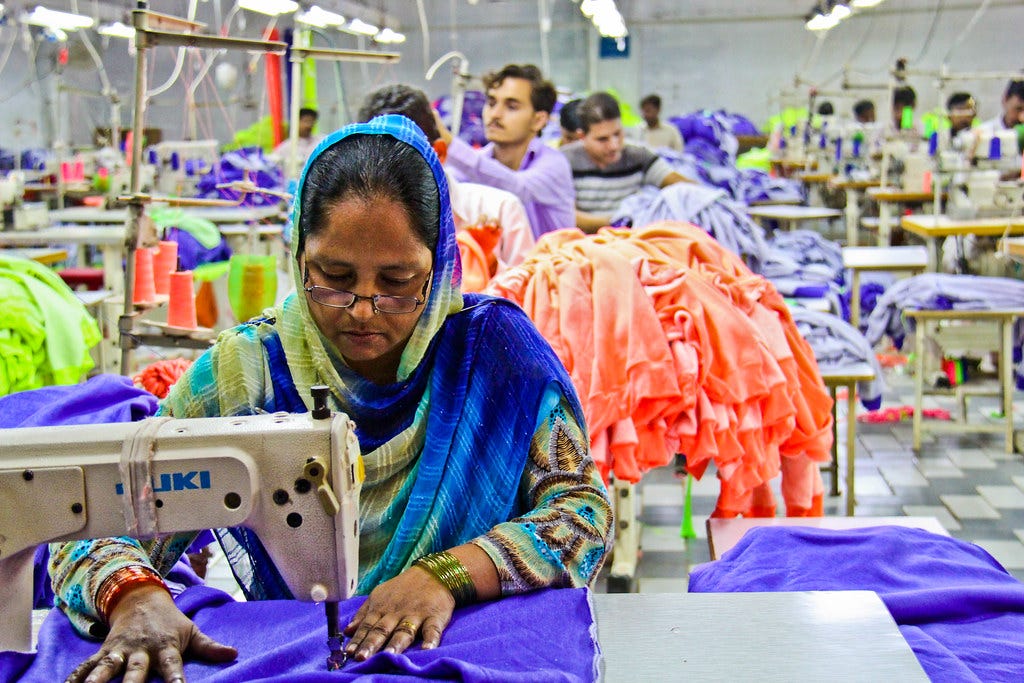~ Enjoy this newsletter? Buy me a virtual coffee to say ta ~
Ah, H&M. You tried, you really did. A crisp white shirt out in nature, for spring? Groundbreaking. Sorry, I meant Greenwashing.
So you may have seen the scandal of H&M (a brand with a net worth of $18.82 billion, 5,000 stores worldwide and 16+ collections a year) claiming they are the ‘most transparent brand in the world’ in a now-deleted Instagram post (savilly screenshotted here). Fashion Revolution addressed the inaccuracy of this claim, clearing up that H&M is ranked ‘most transparent’ on their new 2020 Transparency Index which only reports on major, multi-million pound retailers, and that #transparency does not equal #sustainability. H&M have just rebutted once more in a cheery, uplifting Instagram announcement, alongside this archetypal image, that actually, you dumb idiots, they’re ‘on a journey’.
The problem is - and it’s a problem Fashion Revolution acknowledge and will undoubtedly take forward - is that the average consumer has no idea what transparency is. They don’t care about the carefully considered methodology and implications, they simply want to be told who is a ‘good’ brand and who is a ‘bad’ brand, so they can be absolved of the burden of guilt. The language of the sustainable fashion movement is confusing at best, and brands will jump on reports like this for PR friendly headlines every, single time. No nuance needed.
For me, transparency is still the vital lifeblood of this movement. If we can’t see it, we can’t fix it. But it’s time to shift now from words to action. I’d love to see a brand follow up on a ‘pledge’ or a ‘commitment’ they’ve made with actual concrete evidence verified by third parties. Is that such a big ask? And most of all, we need to educate consumers on the fundamental unsustainability of these billionaire brands in the first place. Eco pledges mean nothing when overproduction is the root of the problem.
For more information on why this H&M debacle is so indicative of fast fashion’s accountability issues, read this brilliant blog post by Melissa Watt, this Medium article by Sarah Tulej, and Aja Barber’s posts here and here.
On a lighter note, Fashion Revolution Week really was a triumph, with tens of thousands of people all over the world digitising their revolution in lockdown. Here in Scotland, we hosted around 20 virtual events, including talks, workshops and panels, with so many insightful conversations surrounding the future of fashion to sink our teeth into. I thoroughly enjoyed the discussions at Fashion Question Time, Earth Logic, and the Fashion Revolution virtual stitch & bitch too. I’ve also collaborated with a fellow FR volunteer, Mary Beth Graham, on a series of fascinating guest blog posts surrounding International Human Rights Law in the fashion industry. Catch up here and stay tuned for more:
NEWSFLASH!
There is a lots lot to catch up on this week - put the kettle on and dive in…
Eco Age | How Covid-19 Exposed the Broken Links in Fashion’s Global Value Chains
BBC | Two million Bangladesh Jobs 'At Risk' as Clothes Orders Dry Up
Vogue | Could COVID-19 Usher in a New Era of Responsibility in Fashion?
The Business of Fashion | What to Do With All That Excess Inventory
Wired |The Race to Design a Rain Jacket That Won't Kill the Planet
The Guardian | Lockdown Has Been a Wakeup Call for the Industry: What Next for Fashion?
Vogue Business | The reality behind fashion’s sustainability certifications and coalitions
Refinery 29 | Can The Zero Waste Movement Survive Coronavirus? It’s Complicated
Vogue | What’s In My Clothes? Why A New Hashtag Asks Us To Go Deeper
The Voice of Fashion | It is An Obligation, Not an Opportunity
Fast Company | Apparel Spending is Down 50%. Here's What it Means
Refinery 29 | 5 Activists On Positivity & Progress In Fashion
Restless Magazine | Should We Really Be Shopping for the Latest Loungewear?
ARE YOU LISTENING?
New podcast episodes to fill your ears with conscious conversation
FURTHER READING
“While retailers beg for rent relief to keep profits flowing into investor’s pockets, the silver lining of these slower fashion cycles is starting to tarnish. Now more than ever, it is vital for the ethical fashion community to mobilise digitally and help garment workers survive this fast fashion apocalypse – but what can we actually do to help?”
I just published an article in Eco Warrior Princess called Will Garment Workers Survive the Fast Fashion Apocalypse? Let me know what you think.
SUSTAINABLE BRAND OF THE FORTNIGHT
I’ve been a huge fan of sustainable period product brand Grace & Green for a while now, recruiting most of my family and friends into the hype train. Now, we’re collaborating on a fundraiser to provide free tampons, pads and liners to frontline staff at NHS Lothian, the hospital trust here in Edinburgh. You can help by taking up a subscription for Grace & Green’s certified organic and plastic-free products and using my code RuthNHS at checkout for 25% off.






